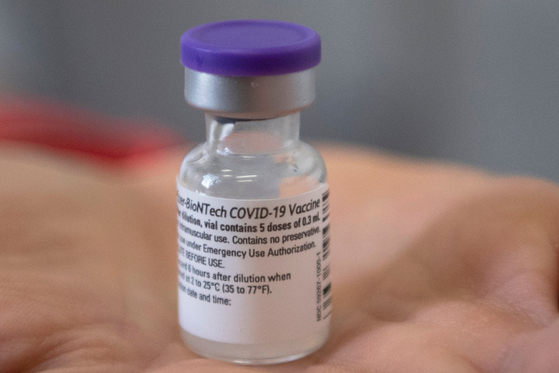Amid controversy over the shortage of COVID-19 vaccines and some countries trying to increase the gap between the first and second doses, the World Health Organization (WHO) has proposed a kind of’compromise’.
WHO “Allow up to 6 weeks in exceptional circumstances”
Manufacturer·FDA opposes expansion of “3 weeks interval compliance”
EU 6 weeks, UK plans to increase to 12 weeks
On the 5th (local time), the WHO advisory group announced that it has created a new provision that the interval between two doses of Pfizer’s vaccine can be extended to a maximum of 6 weeks in’exceptional circumstances’.
The vaccination interval recommended by vaccine maker Pfizer and Bioentech is 3 weeks. The United States and Canada also started the second vaccination on the 4th accordingly. On the other hand, the European Medicines Agency (EMA), the regulatory authority of the European Union (EU), recommends a vaccination interval of 6 weeks. As a result, Denmark increased the vaccination interval to 6 weeks, and Germany is also considering applying it. As countries around the world have entered the vaccination competition and the initial vaccine supply is insufficient, the spread of infected people has not stopped, so it is an incentive to quickly increase the number of primary vaccinations.
![Pfizer's corona vaccine. The shortage of supplies is causing controversy in some countries as the interval between two vaccinations is extended. [AFP=연합뉴스]](https://i0.wp.com/pds.joins.com/news/component/htmlphoto_mmdata/202101/06/d12e998f-35eb-48a6-aea9-a66d0f4cdd54.jpg?w=560&ssl=1)
Pfizer’s corona vaccine. The shortage of supplies is causing controversy in some countries as the interval between two vaccinations is extended. [AFP=연합뉴스]
It is expected that some European countries’ movements will be fueled by the WHO advisory group revealing an extended vaccination interval of 6 weeks on the premise of exceptional circumstances.
However, the day before, Pfizer-Bioentech and the US Food and Drug Administration (FDA) expressed their opposition to measures to expand the vaccination interval different from the original recommendation. Controversy is expected to continue for the time being, as concerns arise over safety and efficacy in the medical community.
On that day, Alejandro Kravioto, chairman of the WHO Expert Strategic Advisory Group (SAGE), told a briefing, “SAGE has limited vaccine supply, and countries with infectious diseases spreading or in exceptional circumstances have a second dose to maximize the number of primary vaccinations. “We have created a clause that you can delay for several weeks.”
However, he emphasized, “There is little evidence that the efficacy of the vaccine will be maintained if the interval between two doses exceeds 3 to 4 weeks,” he recommended, and recommended that the vaccines be given every 3 to 4 weeks as possible. He added, “I think we should be open to this type of decision, which must be made according to the dynamics of each country.”
![On the 5th, the second dose of Pfizer's vaccine is taking place in the United States. [AP=연합뉴스]](https://i0.wp.com/pds.joins.com/news/component/htmlphoto_mmdata/202101/06/9bbfb4ec-e0ce-47a4-9774-a93979436da3.jpg?w=560&ssl=1)
On the 5th, the second dose of Pfizer’s vaccine is taking place in the United States. [AP=연합뉴스]
Kate O’Brien, head of the WHO vaccination team, said, “SAGE looked at the benefits and risks of delaying the second dose of the vaccine without following the protocol applied in the clinical trial (vaccination period). There was intense debate, and SAGE had an interval of about 6 weeks. “The extension has come up with a recommendation that allows it.”
Responding to the WHO’s recommendation, Telegraph said, “This is contrary to the recommendation of UK regulators to have two vaccinations every 12 weeks.” On the 30th of last month, the UK issued new guidelines that allowed the interval between two doses of vaccines to be increased by up to 12 weeks.
Regarding UK policy, SAGE Commissioner Johanhim Hombach acknowledged that “there is a need to be more flexible in the use of second-line vaccines, but keep in mind that there is little data to support this type of recommendation. “Do” he emphasized.
![Corona vaccination is ongoing in Denmark. Denmark has extended the interval between two vaccinations to six weeks. [로이터=연합뉴스]](https://i0.wp.com/pds.joins.com/news/component/htmlphoto_mmdata/202101/06/de90a734-ce8b-4864-8003-84a77c3b026e.jpg?w=560&ssl=1)
Corona vaccination is ongoing in Denmark. Denmark has extended the interval between two vaccinations to six weeks. [로이터=연합뉴스]
Vaccine manufacturers and the FDA are opposed to increasing the interval between vaccinations that differ from the original recommendations.
Pfizer and Bioentech said in a joint statement on the 4th, “Since most clinical participants received a second dose within the time period specified in the study design (3 weeks), the safety and efficacy of the vaccine were not evaluated for that and other vaccination schedules. “He said. “There is no data showing the protection (according to the vaccination) even after 21 days after the first vaccination (effect) continues,” he emphasized.
The US Food and Drug Administration (FDA) also put a brake on it, saying in a statement on the 4th that “we must follow the approved method.”
According to FDA data, the Pfizer vaccine’s phase 3 clinical results showed that a single dose of the vaccine showed an average of 52% of the infection prevention effect. As a result of the second vaccination 3 weeks later, the preventive effect increased to 90.5% after 6 days of vaccination and 95% after 7 days.
Reporter Lim Sun-young [email protected]
